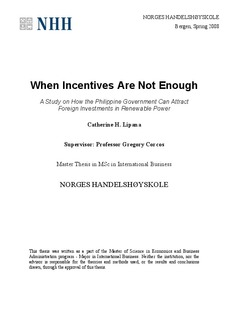| dc.description.abstract | In order to face the rising fuel costs that drive high electricity rates in the country, plus the
problem of climate change as well as the government’s goal to be self-sufficient in energy
supply, the Philippines should invest more in renewable energy. However, for lack of
sufficient financial resources as well as advanced R&D and technology in renewable power,
the country will rely mostly on foreign firms for these types of investments.
This study was geared, therefore, into looking for ways on how the Philippine government
can make the country attractive to foreign direct investments (FDIs) in renewable energy.
In principle, the Philippines should be attractive to renewable power investors because of its
abundant renewable resources, high electricity demand, attractive tariffs, and available fiscal
and non-fiscal incentives. However, research, interviews and surveys revealed that
incentives are not enough to entice these foreign investors to the country. What is needed is
for the government to ensure a stable business climate and streamlined process for opening a
business in order to reduce the cost of doing business in the country. Furthermore, it should
expedite the passage of the Renewable Energy Bill into law to manifest a mandatory support
to and promotion of the use of renewable energy in the country. | en |
